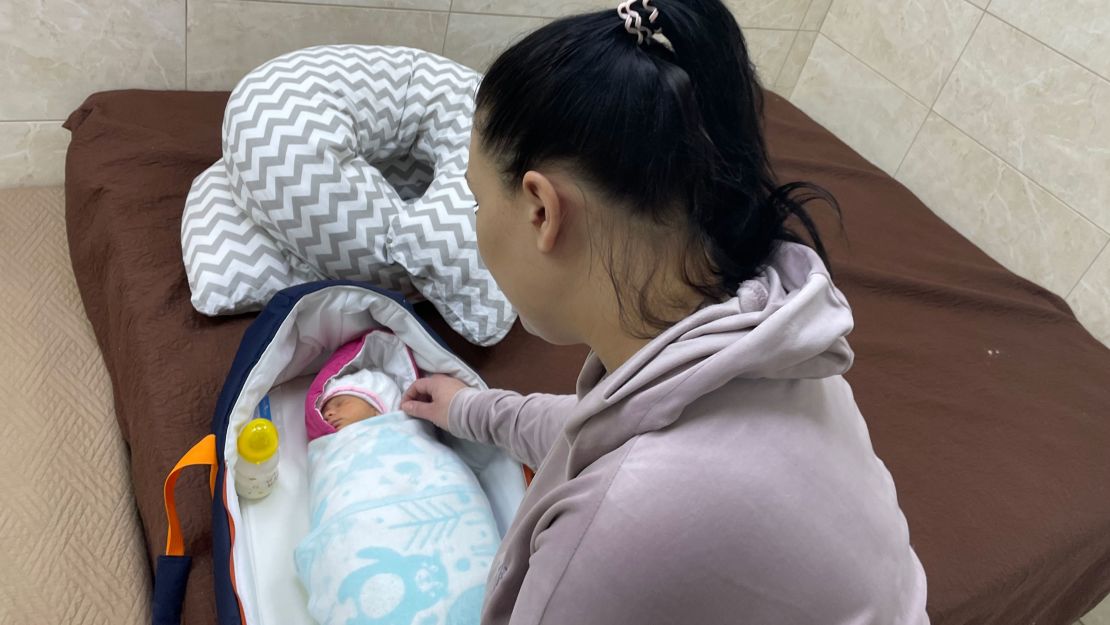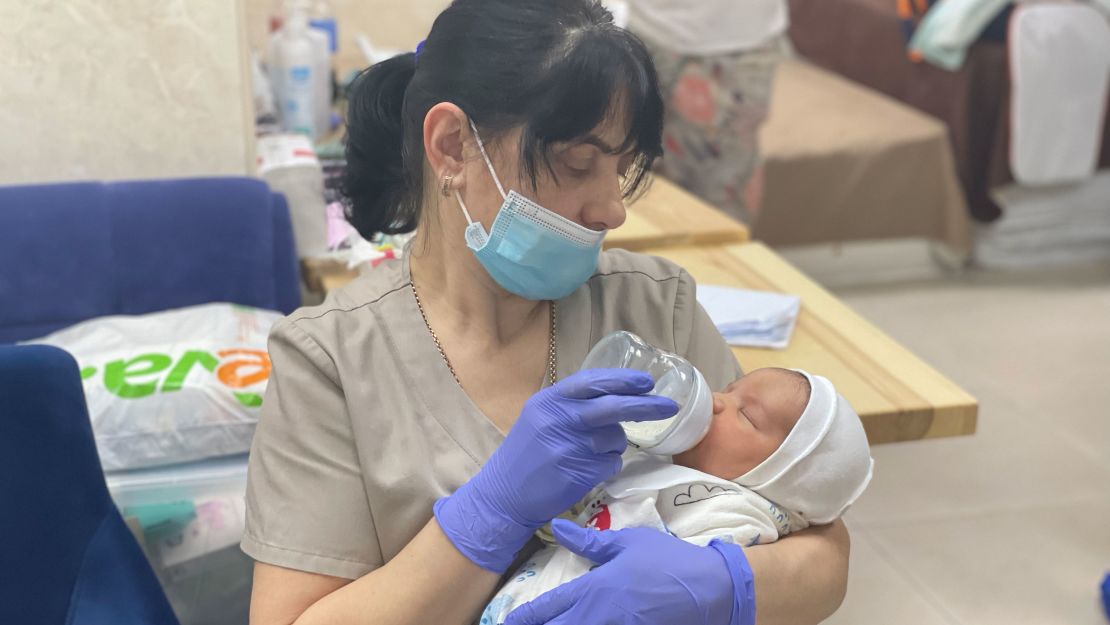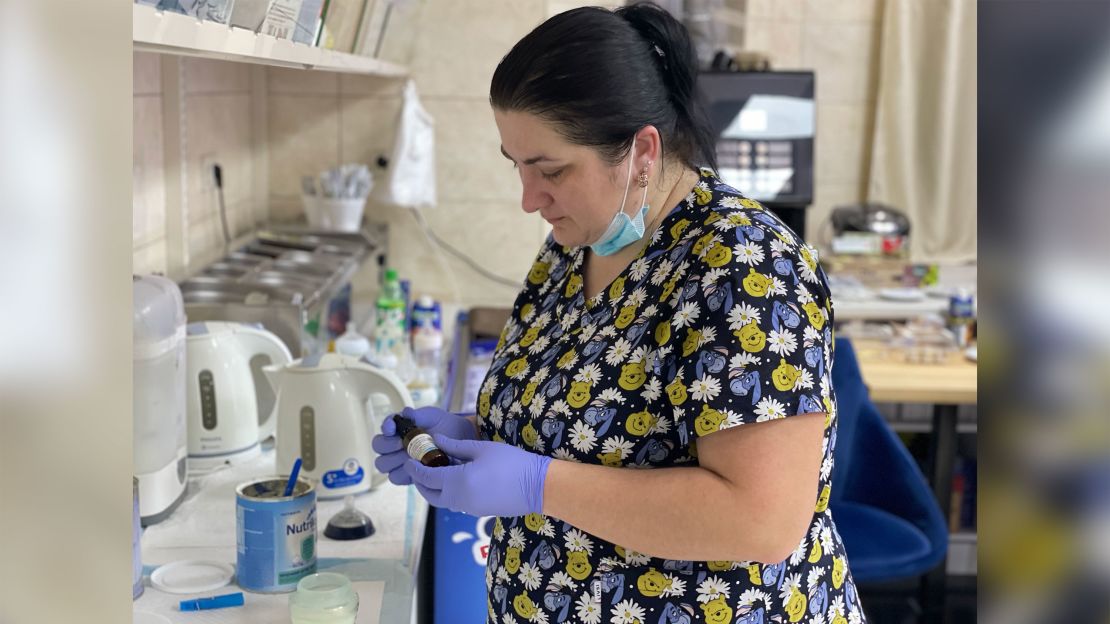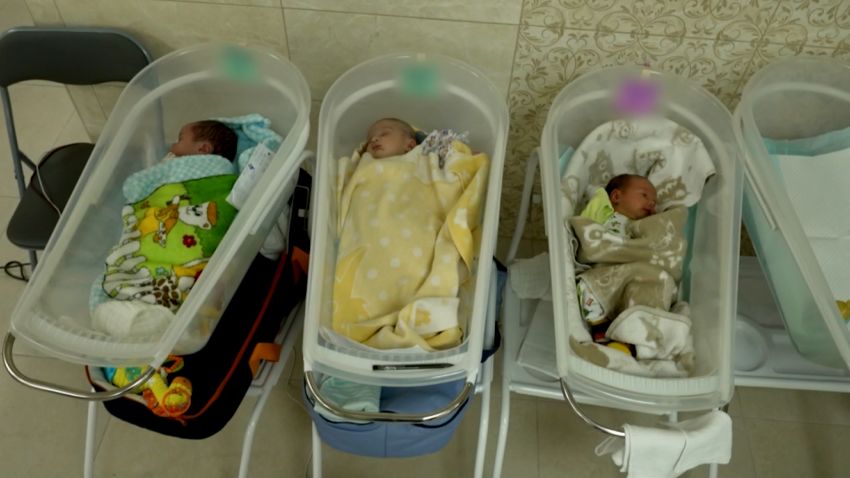The thunder of explosions occasionally rattles the basement that has become the temporary home to 21 babies of foreign parents born to Ukrainian surrogates.
The BioTexCom Center for Human Reproduction surrogacy center in Kyiv was moved to the concrete bunker on the first day of the Russian invasion nearly three weeks ago, to protect the babies from any incoming fire.
But located just over nine miles from Irpin, a suburb that has been a target of a Russian onslaught, it is still far from safe – making it difficult for the new parents, who are in countries such as Canada, Italy and China, to collect the babies.
On Monday morning, a 30-year-old surrogate arrived at the makeshift clinic with the baby boy she delivered in hospital a week earlier. She was unable to hold back her tears as she handed baby Laurence over to the staff.
“It is even harder that he is in a place where there is shelling,” said the surrogate, who only wanted to use her first name, Victoria. “And when will his parents get to take him away because of it? It’s really hard.”
Victoria was transferred from the maternity hospital to the surrogacy center in a van by a center staff member. The staffer drove at nearly 100 miles an hour across the city to try to lessen the chance of being hit by missiles, she said. As Victoria entered the building cradling the baby, she said she could hear the sound of Ukrainian anti-aircraft fire in the distance.
Once inside the basement, there were three louder explosions, one of which brought down an incoming Russian cruise missile less than a mile away. Surveillance footage posted on social media shows a man walking along the street nearby when the intercepted missile fell. No one is believed to have been killed in the blast.

‘They had waited 20 years for their baby’
Baby Laurence’s biological parents, who provided both the sperm and the egg for the pregnancy, live abroad. But it’s unclear when they will be able to collect their son.
“They say they are coming,” Victoria said. “(But) it’s very hard with the paperwork at the moment. How (long) it’s going to (take), nobody can tell.”
Victoria added that she kept Laurence’s parents updated “until the last minute” before she handed the baby over to the surrogacy center. “And hopefully we will keep in touch, because (the situation is) very hard.”
Many countries around the world have strict rules on the practice of surrogacy, and some couples struggling to have a baby naturally have turned to Ukraine in recent years, where commercial surrogacy is not outlawed, and its clinics offer competitive prices compared with other countries.
Ihor Pechenoga, the doctor who helps to run the surrogacy center, said the women are paid between $17,500 and $25,000 for being a surrogate.
Victoria wanted to put the money toward a deposit on a house for her own family, which she has struggled to save for since giving birth to her own daughter at the age of 17. Her now-13-year-old daughter left Ukraine for Bulgaria when the war started, she said.
But after being hospitalized through most of her pregnancy with Laurence due to complications from pregnancy – and facing what she describes as the trauma of giving up the baby she feels she has now bonded with – Victoria said she would never do it again.
BioTexCom has paused the program because of the war, focusing on supporting the women who are currently pregnant, and getting the newborns safely out of the country. While the clinic can try to transport the infants to safer areas in the west of Ukraine, the new parents still have to pick up the babies inside the country for legal reasons – and some are scared to cross the border.

“It all depends on the strength of the parents’ desire,” 51-year-old Pechenoga said. “I met with parents who came to Kyiv to pick up their baby; they had tears in their eyes. They had waited 20 years for their baby, (so) of course they came no matter what.”
But there are also “couples who are afraid, because there is a war going on here, and a serious war,” he said.
Six nannies are working at the clinic to feed and care for the 21 babies. They are becoming increasingly worried about the progress of the conflict, as the bombs land closer to the building. The babies can sense the fear and worry in the room, said one nanny, 37-year-old Antonina Yefimovich.
But the nannies have refused opportunities to leave Kyiv, because they don’t want to abandon the children.
“I would go, (because) I have my own family, too. But we have no one to leave these babies with,” said Yefimovich.

Yefimovich’s mother, husband and two daughters have already fled the city and are now more than 120 miles away.
“Of course, I’m worried about them,” she said. “But I feel better because at least my mother and husband are there. They will take care of the children.”
These babies “can’t be abandoned,” she continued. “They’re defenseless. They also need care. And we really hope that the parents will come and pick them up soon.”

